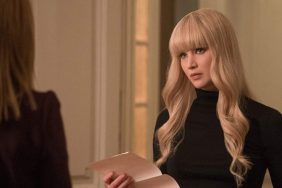Rating: 
5/10
Cast:
Rob Corddry as Bob Howard
Alicia Silverstone as Susan Howard
Michaela Watkins as Judy Small
Anna Pniowsky as Louise Howard
Haley Joel Osment as Reed
David Paymer as Dr. Edward Kingsley
Written by Nancy Doyne
Directed by William Teitler
Summary:
Married couple Bob and Susan Howard decide to see a marriage counselor named Judy Small, who recently relocated close to their home in Los Angeles. When Bob and Susan first meet Judy, she appears competent, intelligent, and trustworthy, with a track record of other couples that she’s treated successfully without incident. But Bob and Susan’s particular emotional dynamic is a trigger for Judy’s dark and conflicted impulses. Suggesting that she see them separately, Judy subtly puts them at odds with one another and brings their marriage to the breaking point in a comically escalating series of manipulations.
What Worked:
It takes courage for actors to jump up on the screen in front of millions of viewers and risk their own self-dignity for our entertainment. Sometimes the risks pay off, sometimes they don’t. In the case of Bad Therapy, nothing pays off for anyone involved. At all.
But I’m supposed to find a silver lining. So, here it goes.
I liked the early bits of Bad Therapy, the new film directed by William Teitler and written by Nancy Doyne, featuring Alicia Silverstone and Rob Corddry as a semi-happily married couple who seek out a therapist to fix their slowly eroding marriage.
Corddry’s Bob is perfectly content as a nature video editor, see? Silverstone’s Susan wants more. Plus, she’s more than a little creeped out when she sees Bob ogling his half-naked stepdaughter. Interesting stuff, for sure. And the two leads possess an affable chemistry that lends these scenes a certain believability that the remainder of the film truly lacks —
Oh, right. Positives.
It’s certainly great to see Silverstone again. I don’t think I’ve seen a single movie with her since Batman & Robin. That’s not an over-exaggeration. She was cute in Clueless, but then just sort of vanished. Her performance here, I’m sorry to say, won’t catapult her back into the A-list spotlight, but she does carry a natural likeability that’s hard to dismiss. I found her believable as a suburban housewife longing for something more out of life; and less believable as a woman spiraling out of control.
Corddry likewise plays Bob as a man who simply doesn’t understand his wife’s frustrations. He loves his job. Loves his house. Loves his wife. Loves his kid. Loves his life. Plus, he has a Mustang. Who would want more?
“Why do we need it,” Bob asks about marriage therapy. “Because we do,” Susan replies.
I guess I liked the message at the center of the film — something to do with family being more worthwhile than money and all that other stuff people need to stay alive in this world. And, to be fair, there were a few scenes here and there that made me chuckle or at least raise an eyebrow.
Sometimes the laughs were aimed at a poorly delivered line or a sequence that made no sense. Like the bit where a man goes to see Michaela Watkins’ Judy Small, discovers one of her numerous crazy secrets and ends up falling down a flight of stairs in a scene that felt more akin to a goofy episode of Desperate Housewives than, say, any of the nail-biting situations in Fatal Attraction — a film Bad Therapy desperately tries to mimic.
Actually, Bad Therapy tries to mimic a lot of films. Here we have a movie made by people who watched many erotic thrillers, but never quite understood them, made on a shoestring budget with actors who simply lack the skills needed to pull off —
Positives. Right.
It was cool to see Haley Joel Osment again. Though the former Academy Award nominee’s role is so brief and inconsequential I forgot he was even in the film after it was over.
It should be said that Bad Therapy does have some clever ideas running through its veins. The notion of a family following the bad advice of an unbeknownst to them crazy therapist certainly sounds intriguing. I mean, wouldn’t you follow the orders of your therapist? At least, initially?
I’m reminded of M. Night Shyamalan’s The Visit, a film in which two kids take a trip to see their grandparents and end up dealing with two old people doing nutty things. The kids don’t question the nuttiness because, well, old people, right? Similarly, Bob and Susan have no reason not to trust a licensed therapist; and the film does a pretty good job showing their gradual distrust in the woman as events start to worsen.
Along the way, we get some half-assed erotica and a truly nutty Michaela Watkins performance that’s so bad it’s actually kind of great. The actress is aiming for Glenn Close levels of glory but comes across more like Lena Hyena in Who Framed Roger Rabbit.
What Doesn’t Work:
Ok. Where to start? Bad Therapy is a weird movie. A wannabe erotic thriller shot on a shoestring budget with actors ill-suited for the material at hand.
And what a waste of great material.
The idea of a therapist purposefully screwing with a family opens the door for plenty of unique opportunities, both comedic and horrific. Think What About Bob, except in reverse. Sort of. Unfortunately, no one involved (outside of Watkins) seems fully committed. And so, we end up with a film that is neither funny enough, nor dark enough, nor sexy enough to pass as anything more than good-enough-for-Lifetime. Yuck.
There’s a lot to unpack. So, I figured I’d write down the most important questions I had at the end of the film just to keep this review short-ish:
Are we supposed to laugh at the psychiatrist as she talks to mannequins and tries to seduce Bob whilst wearing the same pink sweaters Ed Wood liked to bounce around in?
Are we supposed to feel for Bob when he “slips” and accidentally lets this psycho take off his pants in his own home — as every guy would do, amirite?
Is Bob a creep for looking at his really young stepdaughter? And why is this storyline never touched upon again?
What is the point of Bob and Susan’s daughter, Louise? And why does she have a giant container of cheese balls during the climax of the film?
Why do people take drugs so casually in this movie? How can a person take so many drugs and still find a way to drive back to their home without incurring the same type of collateral damage Leonardo DiCaprio sustained in Wolf of Wall Street? I’m not a drug guy, so I’m asking: do the drugs in this film really make people act like that?
Did David Paymer know he was being filmed? I’ve seen the man act great in movies like Mr. Saturday Night and Payback. His scenes look like dress rehearsals that were accidentally shot right before lunch.
I don’t necessarily need anyone to answer these questions. But feel free to comment below or call my personal cell phone number to talk things through.
Bottom Line:
Bad Therapy works as a sort of low budget thriller one might enjoy late at night or with a bunch of friends and a lot of booze. Some of you might even find it clever. I found it bland and more than a little bizarre. For all its brazen attempts to crack open the nuclear family and examine the raw emotions tucking within its core, Bad Therapy has no true identity and is in dire need of its own therapy session.
Bad Therapy is available now on Amazon Prime Video. Pick up your copy here!
We are a participant in the Amazon Services LLC Associates Program, an affiliate advertising program designed to provide a means to earn fees by linking to Amazon.com and affiliated sites.










